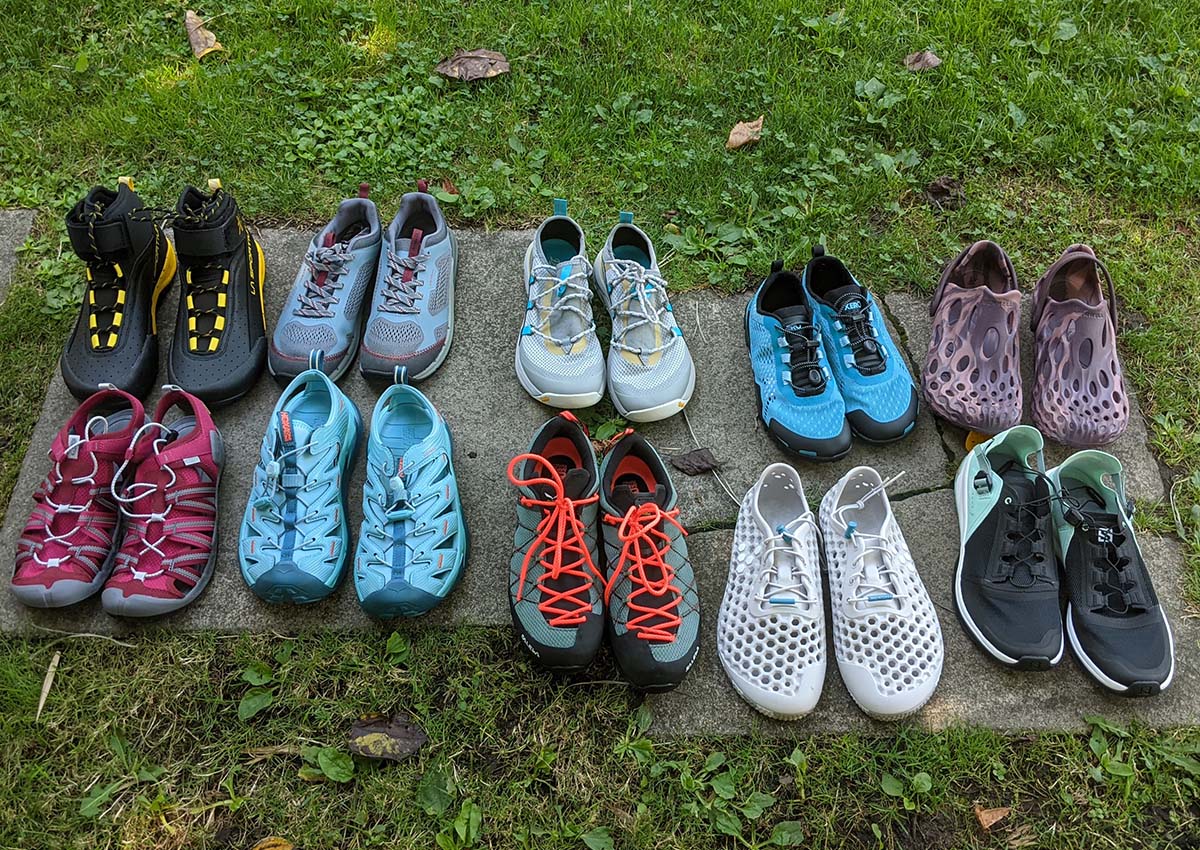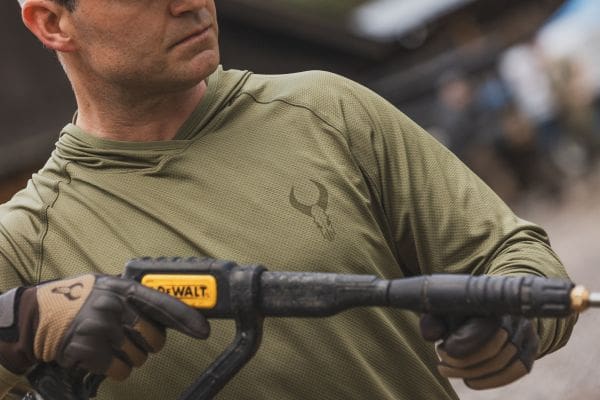We may earn revenue from the products available on this page and participate in affiliate programs. Learn More ›
To get after some of the best adventures out there, you’ll have to make your peace with wet feet — hiking The Narrows in Zion, trekking through a rainforest on Kauai, circumnavigating Oregon’s Mount Hood. On these trips, even the highest-high top GORE-TEX hiking boot won’t keep your feet dry: The water is just going to spill over the top. What you’ll need is one of the best water shoes for hiking, one with enough traction, versatility, and protection to see you through that next big adventure.
Best Overall: KEEN Drift Creek H2 (Men’s) (Women’s)
↓ Jump to Review
Best Protection: La Sportiva TX Canyon (Unisex)
↓ Jump to Review
Best Barefoot: Vivobarefoot Hydro ESC (Men’s) (Women’s)
↓ Jump to Review
Most Comfortable: HOKA ONE ONE Hopara (Men’s) (Women’s)
↓ Jump to Review
Best Minimalist: XeroShoes Aqua X Sport (Men’s) (Women’s)
↓ Jump to Review
Best for Boats: Astral Loyak (Men’s) (Women’s)
↓ Jump to Review
Best Sustainably Made: Vivobarefoot Ultra III Bloom (Men’s) (Women’s)
↓ Jump to Review
Best Camp Shoe: Merrell Hydro Moc (Men’s) (Women’s)
↓ Jump to Review
How I Tested the Best Water Shoes for Hiking
From a childhood spent hiking along the Pacific Northwest coast to crossing glacial fords while circumnavigating the region’s volcanoes to exploring the slot canyons of the Southwest, I’m well versed in the different environments where a hiker may choose a pair of water shoes over the best hiking shoes. To test the shoes in this story, I started by checking out a number of technical details of the shoes themselves, including their stack height and weight (heel drop information is taken from the manufacturer websites).
| Water Shoe | Buy It | Price | Weight | Stack Height | Heel-to-Toe Drop | Arch | Outsole Grip | Drainage | Stability | Dry Time | |
| Astral TR1 Loop Shoes | M’s | W’s | $125 | 10.3 oz | 26mm | 1mm | Med. | Good | Fair | Good | 28 hrs |
| Astral Loyak | M’s | W’s | $95 | 6.9 oz | 11mm | 0mm | Med. | Good | Good | Great | 18 hrs |
| Danner Rivercomber | M’s | W’s | $160 | 8.9 oz | 30mm | 4mm | Low | Poor | Good | Good | 7 hrs |
| HOKA ONE ONE Hopara | M’s | W’s | $135 | 11.2 oz | 38mm | 5mm | Med. | Good | Great | Good | 6 hrs |
| KEEN Drift Creek H2 | M’s | W’s | $100 | 8.0 oz | 20mm | 4mm | Med. | Good | Great | Good | 12.5 hrs |
| La Sportiva TX Canyon | Unisex | $190 | 16.0 oz | 25mm | 8mm | Low | Good | Poor | Good | 25 hrs | |
| Merrell Hydro Moc | M’s | W’s | $60 | 7.3 oz | 29mm | 10mm | Med. | Poor | Great | Good | 1 hr |
| Salewa Wildfire 2 | M’s | W’s | $170 | 12.1 oz | 40mm | 11mm | Med. | Great | Fair | Fair | 36 hrs |
| Salomon Tech Amphib 4 | M’s | W’s | $110 | 9.1 oz | 32mm | 8.8mm | High | Good | Good | Good | 15.5 hrs |
| Vivobarefoot Hydra ESC | M’s | W’s | $210 | 10.0 oz | 6mm | 0mm | None | Great | Great | Great | 15.5 hrs |
| Vivobarefoot Ultra III Bloom | M’s | W’s | $120 | 6.3 oz | 9mm | 0mm | None | Fair | Great | Great | 1.5 hrs |
| XeroShoes Aqua X Sport | M’s | W’s | $130 | 6.7 oz | 12mm | 0mm | None | Great | Great | Great | 15.5 hrs |
Next I took them to a local coastline to tromp around in the water, getting the shoes thoroughly soaked and allowing sand and small rocks to get trapped in the shoe underfoot (where possible) to see how easy (or difficult) it was to swish them out again. Next, I hiked around for a short period of time, noting any unexpected hot spots caused by friction with the fabric.
After this, I took the shoes to another test site to check for traction, walking up and down a short but steep sandy hill to see how well the shoes did or did not grip. The last test was for dry time, where I soaked all of the shoes and then checked how long it took for the shoes to dry in a room with low humidity. Initial testing took place in September 2022. In June 2024, I completed additional testing of the Vivobarefoot Hydra ESC and the Astral Loyak.
The Best Water Shoes for Hiking: Reviews & Recommendations
Best Overall: KEEN Drift Creek H2
Men’s Sizes
Key Features
- Weight: 1 pound per pair
- Available Sizes: Men’s 7-15; women’s 5-12
- Runs true to size
Pros
- Reasonably priced
- Great drainage
- Comfortable
- Secure fit
Cons
- Not enough protection for the most treacherous stream crossings
If you spend a lot of time in the water and want a shoe that can transition easily from a lazy paddle to a fast-moving day hike, then the KEEN Drift Creek H2 is the shoe for you. The relatively low stack height of this shoe means it had good stability on uneven surfaces and surprisingly good traction for a hiking sandal. But what stood out the most with the Keen Drift Creek H2 was its drainage. Not only did water clear out of the shoe almost as soon as I got to shore, but it was also easy to clear out any sand or pebbles by giving my foot a gentle shake in the water.
The downside of this design is that it means you have less protection overall from objects in the river itself (although the Drift Creek H2 does have robust toe protection, unlike most hiking sandals). Most of the time, this won’t be an issue, but if you plan to do extensive hiking in fast currents or murky water, you’d be better off going with either the Salomon Tech Amphib 4 or La Sportiva TX Canyon.
Best Protection: La Sportiva TX Canyon
Unisex Sizing
Key Features
- Weight: 2 pounds per pair
- Available Sizes: EU 37-47.5 (U.S. men’s 5-13; women’s 7-15)
- Runs slightly large
- Unisex sizing is fairly narrow
Pros
- Great ankle support
- Locks foot in while allowing toes to splay
- Good foot protection
Cons
- Expensive
- Worst drainage in my test (and takes a long time to dry out)
- Heavy
Not all hiking adventures involving water are created equally. Some are relaxed affairs with lots of casual stream crossings, while others involve crossing icy, murky glacial streams with a swift current. And still others involve more time in the water than out of it, like the iconic Narrows of Zion National Park.
If you’re looking at a hike that will have you trekking for hours and hours in the riverbed itself — over slippery rocks, logs, and anything else lurking at the bottom of a canyon — then you’ll need a shoe that prioritizes protection and support over drainage and a fast drying time. The La Sportiva TX Canyon provided the most protection of any shoe I tested. It has a thick rubber toe that bands around the side to protect the side and arch of the foot, and it has tight laces complemented by velcro straps that lock your foot securely into place.
While this shoe had a higher stack height than traditional minimalist trail runners, it measured substantially lower than other water shoes for hiking that I looked at. The lower stack height minimizes the odds that you would roll your ankle, while the stiff ankle supports provide protection against loose rocks or other river debris hitting your heels. Despite the locked-in fit of the La Sportiva TX Canyon, this shoe has a surprisingly wide toe box that doesn’t put undue pressure around the ball of the foot and allowed my toes to splay naturally.
The cons of this shoe are that they are expensive, the most expensive of any I tested, and provide limited drainage. If you are looking for a hiking boot for casual stream crossings, this is not the right pick for you, but it is my number one pick for anyone looking forward to a canyoneering expedition.
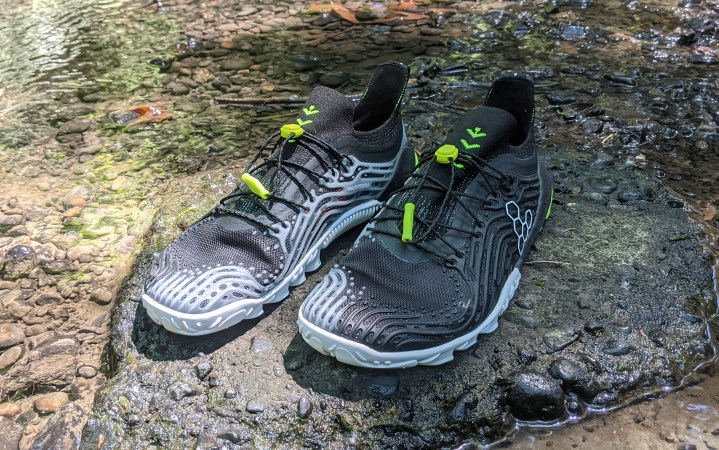
Men’s Sizes
Key Features
- Weight: 1 pound, 4 ounces per pair
- Available Sizes: Men’s 7-15; women’s 4.5-11
- Runs wide to size
Pros
- Great traction
- Drains well
Cons
- Padding at the heel is somewhat distracting
- Expensive
As someone who has long worn the best barefoot shoes, the Vivobarefoot Hydra ESC is what I would choose to go hike something like The Narrows. These shoes have excellent traction. They drain well. And they are exceedingly stable. While the padding at the back of the heel is my one (minor) gripe, I could feel how much it was reducing potential abrasion after I was climbing up a steep hill with wet shoes.
Truly, the biggest limiting factor here is price. The Vivobarefoot Hydra ESC were the most expensive shoes I looked at, even pricier than the more technical La Sportiva canyoneering shoes.
Most Comfortable: HOKA ONE ONE Hopara
Men’s Sizes
Key Features
- Weight: 1 pound, 6.4 ounces per pair
- Available Sizes: Men’s 5-13; women’s 7-15
- Runs true to size
Pros
- Ample cushion
- Wide footbed provides increased stability
- Good traction
- Dried fairly quickly
Cons
- Additional bulk can feel awkward
- Hard to get grit out once it’s under your foot
Product Description
HOKA ONE ONE has a dedicated fan base, so if you know their shoes work well for you in other contexts, then you should feel comfortable choosing the Hopara for all but the most dicey canyon treks. Everyone else, here’s the skinny: These are extremely padded shoes, which most people find pretty darn comfortable. To help compensate for all that extra stack height from the cushioning, HOKA’s shoes expand out the base of the footbed. This works pretty effectively — the Hopara scored well for stability during testing — although the aesthetic that first comes to mind when you put on a pair is “moon shoe.”
The HOKA ONE ONE Hopara also scored well for drainage and dry time, meaning that it would function well on a river trip where you are transitioning from boat to trail and back again. Despite being the most comfortable shoe, its overall weight makes it a poor choice to take as a camp shoe on a backpacking trip.
Best Minimalist: XeroShoes Aqua X Sport
Men’s Sizes
Key Features
- Weight: 13.4 ounces for a pair
- Available Sizes: Men’s 6.5-15; women’s 5-12
- Runs small; recommend going up a half size if you plan to wear socks
Pros
- Great drainage, grip, and stability
- Zero heel drop and low stack height improves stability
- Lightweight and comfortable
Cons
- Not suitable for individuals that need arch support or heel cushioning
Let’s start with what’s most notable about the XeroShoes Aqua X Sport, its minimalist design. It has no arch support, no heel drop, and very minimal padding against the ground. If you are looking for a supportive shoe then this is not the right pick for you. Everyone else, keep reading.
There were a number of details that made this one of the best water shoes for hiking. First up was this shoe’s drainage: Mesh panels at the sides meant that water drained out quickly, helping to speed up the drying time. I also liked its substantial cleats on the underside. Combined with the low stack height and good ground feel, I had excellent traction on a variety of surfaces.
The position of the mesh on this shoe meant that once dirt and grit got inside, it was difficult to get it back out again. If you are hiking in sandy or gravelly terrain, you might need to stop every so often to fish rocks out of your shoe. I also wish the toe box was slightly wider to allow for splay and further improve stability.
Best for Boats: Astral Loyak
Men’s Sizes
Key Features
- Weight: 13.8 ounces per pair
- Available Sizes: Men’s 8-14; women’s 6-11
- Runs somewhat wide
Pros
- Lightweight
- Low-key design
- Surprisingly good traction
Cons
- Canvas material not suited for walking long distances
Whether you are canoeing, kayaking, or sailing, there are plenty of times that you shoes appropriate for a boat that will, occasionally, do double-duty as a pair of hiking kicks. The Astral Loyaks are a nice choice for boat-based adventures because they breathe (and drain) well, and had much better traction than I was expecting for a shoe with no lugs. That being said, I wouldn’t wear these shoes for longer distances, as the canvas material will eventually start to chafe your foot.
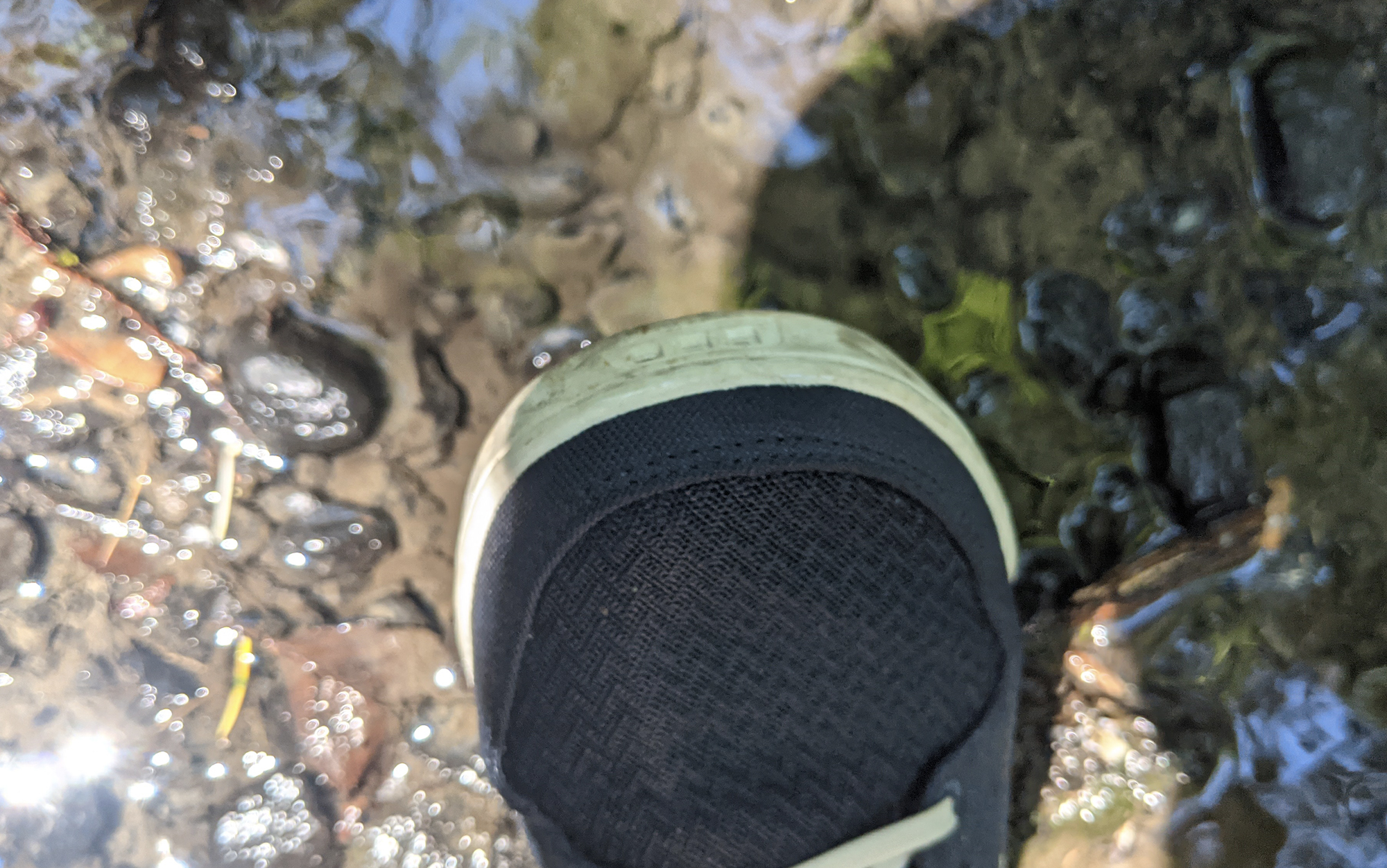
Laura Lancaster
While the Astral Loyak doesn’t bill itself as a minimalist shoe, that is essentially what it is. It’s fairly wide, has a low stack height, and no heel-to-toe drop. The biggest difference here is in the insole, which has enough cushioning to stand in for arch support.
Read Next: It’s Time to Give Barefoot Shoes a Try
All of this is great if you are trying to keep your balance on a boat, but could spell disaster if someone who is accustomed to more traditional shoes tries to wears them all day without first adapting their feet.
Men’s Sizes
Key Features
- Weight: 12.6 ounces for a pair
- Available Sizes: Men’s 7-15; women’s 5.5-11.5
- Runs large and very wide
Pros
- Manufacturing process helps improve waterways
- Zero heel drop and low stack height improves stability
- Lightweight enough to be a camp shoe
- Fast drying
Cons
- Extra width makes it difficult to get a secure fit
- Minimal traction
Let’s get the bad out of the way first. These are not suitable shoes for long hikes. Their unusually loose fit and inadequate traction just don’t provide enough functionality for this purpose. However, they are a serviceable shoe for shorter, easy hikes and a great casual water shoe with excellent drainage and stability. The Vivobarefoot Ultra III Bloom also has a lot of potential as a camp shoe, thanks to one unique design element: These are unusually wide shoes.
Anyone who has put serious miles on the trail during a backpacking trip knows that your feet have a tendency to swell over time, a combination of your feet retaining water and, on multi-day trips, the ligaments themselves starting to loosen. That’s why so many people recommend sizing up the best hiking boots. It’s also why it feels so great to take them off at the end of the day. Choosing a wider camp shoe, like the Vivobarefoot Ultra Bloom III, can help to give your feet a rest after a hard day of hiking, so that you’re energized and ready to go in the morning.
The other unique feature of the Vivobarefoot Ultra Bloom III is its eco bonafides. The upper is foam derived from algae, which was harvested from waterways around the world where an excess in algae (which can occur as a result of both rising temperatures and agricultural runoff) has the potential to result in toxins entering waterways.
Best Camp Shoe: Merrell Hydro Moc
Men’s Sizes
Key Features
- Weight: 14.6 ounces per pair
- Available Sizes: Men’s 7-15; women’s 5-11 (kid’s sizes also available)
- Runs wide
Pros
- Affordably priced
- More secure fit than the Croc Clog
- Fast drying
Cons
- Not suitable for hiking longer distances
- Not as secure a fit as other shoes I tested
Lightweight, loose-fitting, and comfortable, Crocs have long been a go-to for backpackers that choose to bring a camp shoe. And since they are impervious to water, they’re also often pressed into double duty as a water shoe for stream crossings. But it turns out the loose fit of the Croc can be a little too loose, and the back heel strap that keeps your shoe on while walking can slip off in any current above a trickle.
If any of this sounds familiar to you, then it’s time to upgrade to the Merrell Hydro Moc. While not as secure as some of the other picks on this list, I was impressed by how well the back heel strap locked in my foot. That makes this a serviceable option for even knee-deep stream crossings — although swift currents (like glacial fords) may still result in a lost shoe. Their EVA foam construction also means that they dry out quickly, the fastest of any shoe in my test.
Like the Croc Clog, the Merrell Hydro Moc is extremely comfortable and an excellent choice for puttering around camp after a hard day of camp.
Salomon Tech Amphib 4 — OUT OF STOCK
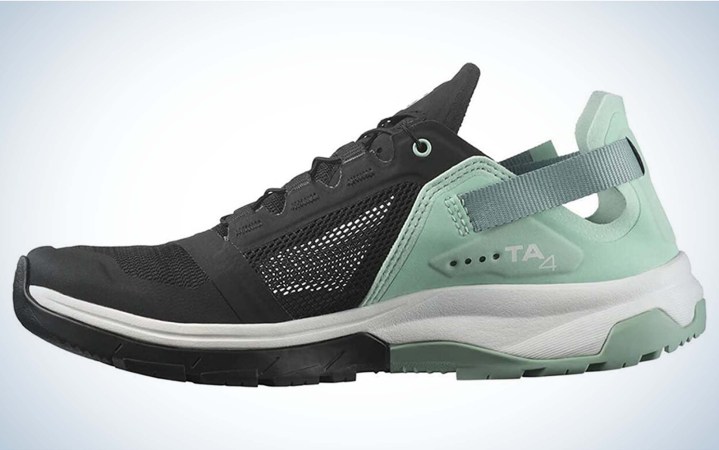
Salomon
Key Features
- Weight: 1 pound, 2.2 ounces per pair
- Available Sizes: Men’s 7-13; women’s 5-10
- One-pull tightening lace
Pros
- Secure fit
- Lower price than other shoes I tested
- Good drainage, grip, and stability
Cons
- No wide option available
- High arch support may be distracting for some
Despite being my choice for the best fit, the excellent Salomon Tech Amphib 4 was out of stock as of the update of this review. In conversation with the company’s representatives, my understanding is that this shoe will be restocked in Spring of 2025, when I will update this story with the relevant links to purchase. However, if you find a pair on clearance in the meantime, you should definitely snag them.
Attention hikers with narrow to average width feet that prefer a high arch: This is your shoe. The Salomon Tech Amphib 4 scored well on drainage, stability, and traction. It not only has high arch support (the most of any shoe I tested) and quick-cinch laces that tighten the shoe around the midfoot, but it also incorporates an adjustable strap at the back heel that can be used to completely lock the Tech Amphib 4 down on your foot. Doesn’t matter how swift the current your fording is: This shoe isn’t going anywhere.
The biggest downfall of the Amphib is that the secure fit it achieves also means it’s one of the narrower shoes that I looked at — not quite too narrow for individuals with an average width foot, but if you have even a slightly wide foot, this is unlikely to work for you.
Things to Consider Before Buying Water Shoes for Hiking
Purpose of the Best Water Shoes for Hiking
Which shoes you pick will depend in large part on what your intended activity is. If you are looking to trek up a river through a canyon, you’ll want robust ankle support and protection from the elements. Those headed on a more traditional day hike, perhaps one with numerous stream crossings, may want to choose a shoe with great drainage and a fast drying time.
Toe Box of the Best Water Shoes for Hiking
While there are plenty of hiking sandals and footwear for boats that have an open-toe design, it is important to choose a water shoe for hiking that has a closed toe box to protect your feet from injury in the event of hidden obstacles under a fast-moving current.
Drying Time of the Best Water Shoes for Hiking
The length of time it takes for a shoe to dry out depends on a few factors, including the type and thickness of the material it’s made out of and how well the shoe drains once you step out of the water. Generally, faster drainage will result in faster drying, and foam and mesh uppers will dry faster than those made from thicker fabrics.
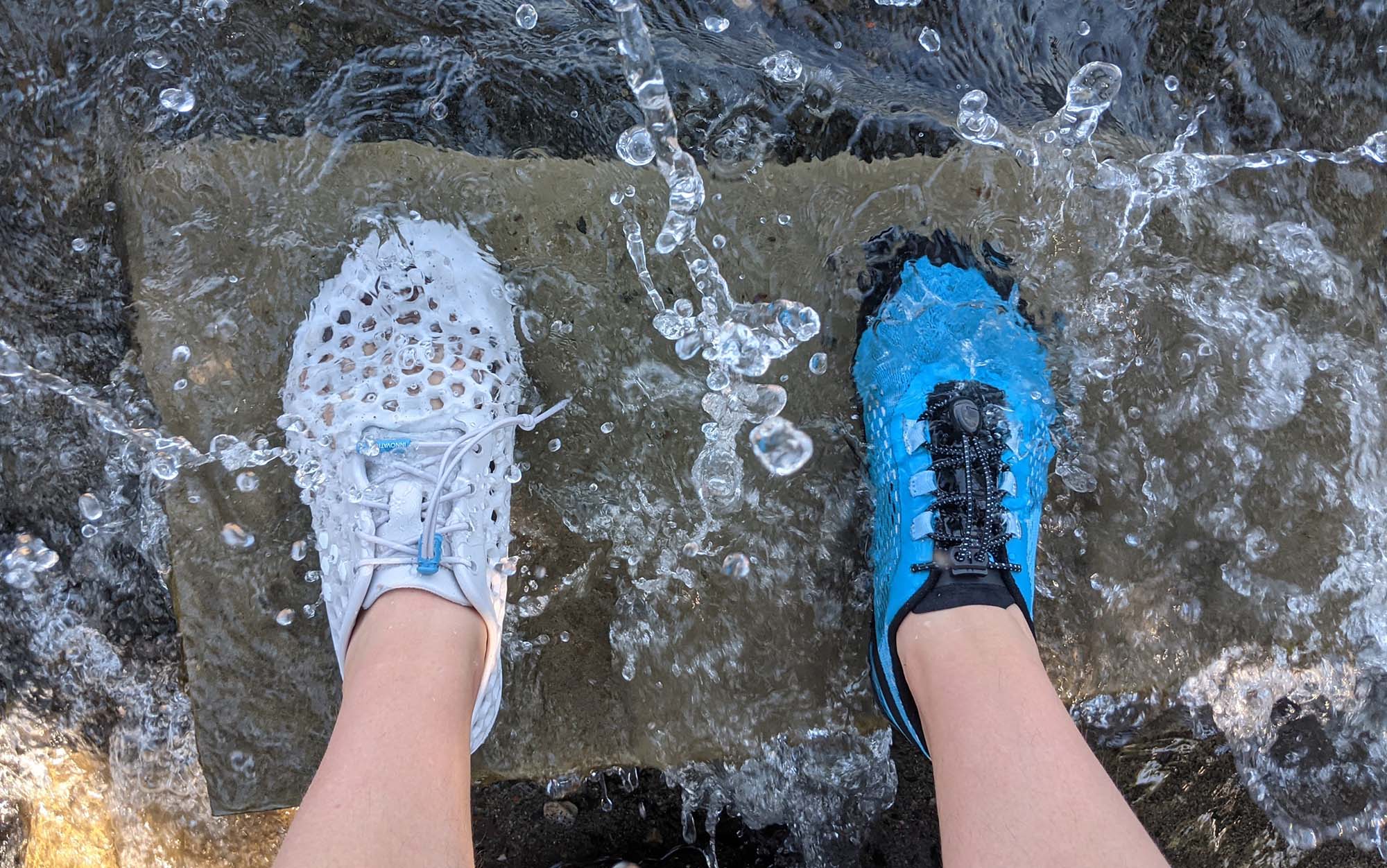
Traction of the Best Water Shoes for Hiking
While most water shoes have fairly minimal tread, you’ll want to consider what level of traction you’ll need on your adventure. Keep in mind the surface (sandy slopes versus slick rock, for instance) and potential for elevation gain.
FAQs
Water shoes for hiking typically cost between $50 and $180.
Whether you wear socks with your water shoes for hiking depends on the temperature of the water, how much hiking on dry land versus hiking in water you expect to do, and your propensity for blisters. If you expect to hike in cold water for extended periods of time, consider getting neoprene socks, or choosing a wetsuit with integrated socks. If you’re looking at hiking on dry land for the majority of your trek, then having a pair of the best hiking socks to pair with your shoes (once they dry out sufficiently) can help keep your feet comfortable. Finally, if you are prone to blisters, wearing socks is essential to reducing abrasion between your feet and the shoe as well as managing moisture when you’re not walking in water.
Hiking shoes, including water shoes for hiking, should be locked in at the heel, but then loosen up as the foot moves forward. If the balls of your feet feel constrained or your toes are unable to splay (inhibiting shock absorption) then the shoe’s volume is too small for your foot. One option to increase the volume of the shoe is to take out the insole. If you are using a camp shoe to cross a stream and then switching back to your hikers, then whether or not you can get away with a loose-fitting shoe depends on the swiftness of the stream.
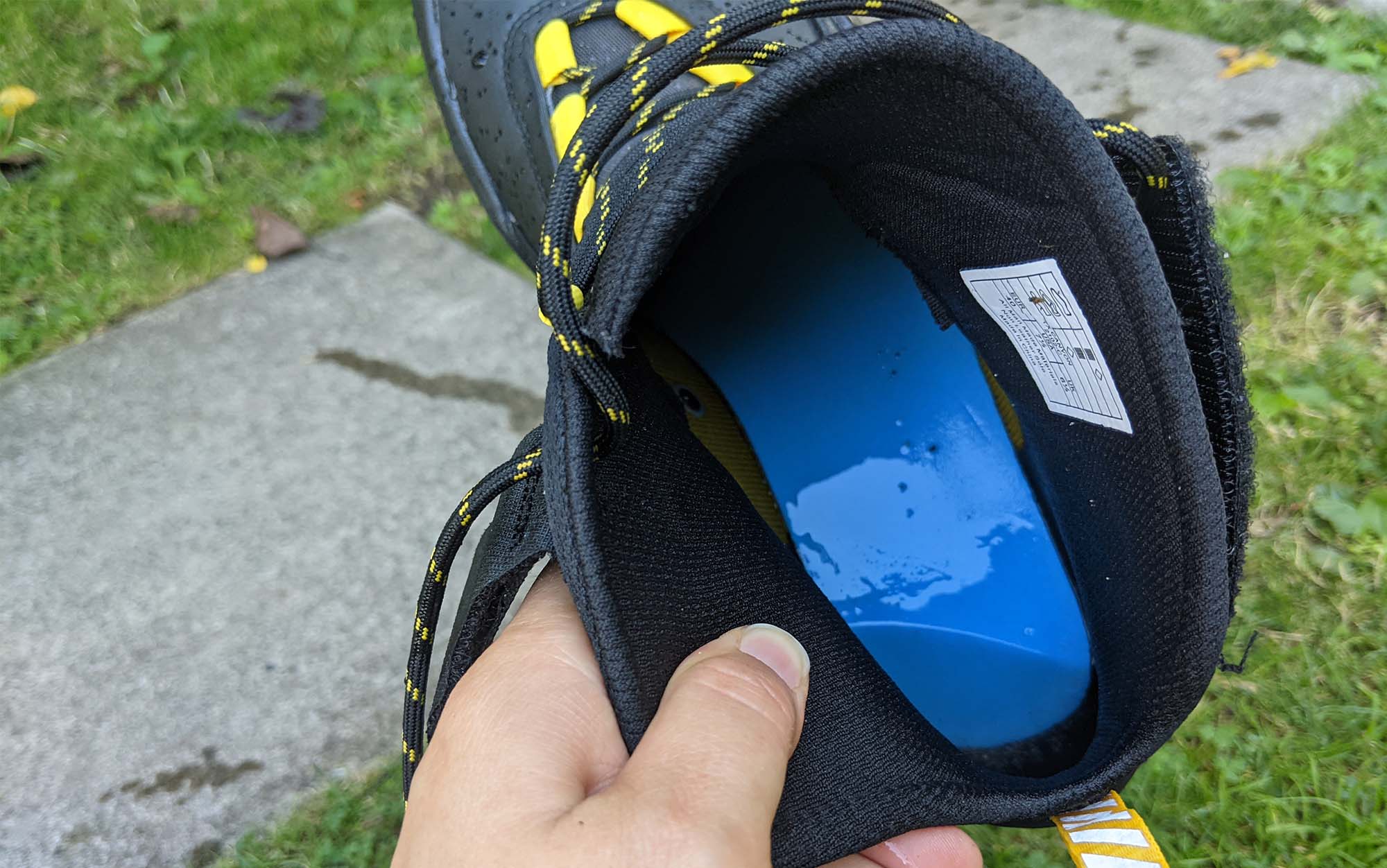
Final Thoughts on the Best Water Shoes for Hiking
After checking out ten of the best water shoes for hiking from some of the most respected brands, I’m confident that the top choice for most people is the KEEN Drift Creek H2. Those planning a more rigorous canyoneering trip should go with La Sportiva TX Canyon, while those looking for a camp shoe that can also be used to forge the occasional stream should choose the Merrell Hydro Moc.
Read the full article here

